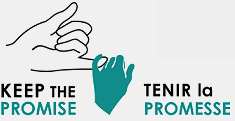Three portraits of child poverty
by Annie McEwen, PhD Public Policy Candidate, Carleton University, anniemcewen.ca
“If you see something, say something.” It’s a phrase that normally applies to terrorism, to encourage people to speak up when they see a threat to public safety. But today it motivates me to say something about a different type of threat I saw last week. A threat no less important to our country’s well-being: child poverty. To me, it is much more frightening than a backpack left unattended on Parliament Hill, and I wish there was someone I could call who would respond to this threat as seriously as to that hypothetical backpack. But there isn’t. So, I’m saying something.
Last week, in one day I saw three portraits of child poverty in Canada.
The first was the face of a mother who was too grateful for an extra litre of milk I gave her at the Parkdale Food Centre, an Ottawa community food bank where I volunteer. She had come into the Centre for the second time this month because the cupboards were bare, her wallet empty, and she has two school-age kids to feed, one of whom has a disability. She didn’t want to ask for too much, she said. She knew the food bank policy is one emergency food supply order per month, and others hadn’t yet had their first order. So the extra litre of milk, granola bars, and bagels I gave her, alongside two too-small bags of groceries to get her through the week, made her eyes water as she thanked me twice. I shouldn’t have said “You’re welcome.” I should have said I’m sorry, I’m sorry that we can’t do better for you and your kids.
The second image was of a little boy, just over a year old, and his mother returning to their one-room home at a family shelter run by the City of Ottawa. They too had been at the Parkdale Food Centre that morning, and I was helping them home with their groceries in the bitter cold. The mother, the little one, and his two older siblings have been “temporarily” sharing that one room at the shelter for at least six months. Despite the bright day, the basement room was dark and cluttered with all the family’s belongings in piles between bunk beds. The table was piled high with dishes yet to be done in the shared kitchen down the hall. There was no place for the little guy to safely play or learn to walk, no privacy for the teenage boy or uncluttered space to do homework. The mother was cheerful and positive; she’s optimistic she’ll get into permanent housing within the next month, before Christmas. Thinking of those three kids, whose bright futures are made dimmer by their daily experience of poverty, I’m keeping my fingers crossed for her.
The third portrait was a political one, inspiring but no less heartbreaking at the same time. I was honoured last week to attend the Town Hall of the Keep the Promise National Student Summit, which brought together students from every province and territory of Canada to mark the 25th anniversary of the House of Commons’ resolution to end child poverty by the year 2000. After a day of interactive discussion, the Town Hall was the students’ chance to present their message to Canadians, including invited Members of Parliament. Standing literally on their tiptoes, small but bright and eloquent children approached a microphone to tell the audience that their peers’ basic needs of food and shelter are not being met. Poverty has multiple causes and effects, but it can and should be fixed, they said. It was inspiring to see young people thoughtfully discussing challenging issues and standing up for their rights.
The children asked Canada to keep our 25-year-old promise to eliminate child poverty. Then, one by one, MPs from each party took five minutes to respond with a few political words. That is, from each party except one; not one of the 163 Conservative government MPs could make themselves available to attend the event and listen to these children. The disgracefulness of this absence is a shameful portrait of continued government inaction on child poverty in Canada.
I have researched Canadian child poverty, full-time, for four years, as I work towards my PhD in Public Policy. I’ve crunched the numbers and seen the data statistically spell out the effects of poverty on kids’ lives. Even at this abstract level, it’s never a happy or easy story. Usually I take a fairly sanguine outlook, critical yet optimistic. But something struck a nerve last week making me truly angry at my country for turning a blind eye to these children and their parents. Child poverty is not a mysterious unknown threat like terrorism; poverty is hiding in plain view and we all know its awful effects. It’s up to all Canadians to listen to our children, to say something, because this is a threat we all should see.
 Keep The Promise
Keep The Promise